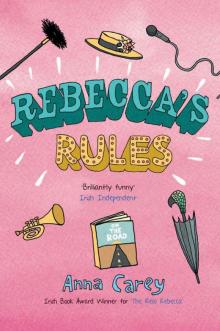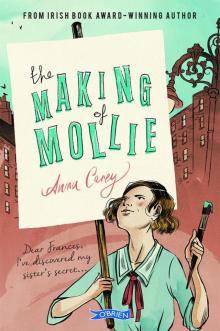- Home
- Anna Carey
The Making of Mollie Page 2
The Making of Mollie Read online
Page 2
Walk to school, usually in the rain, which means by the time I get there I am tired or wet or both.
Sit through hours and hours of boring lessons (well, I suppose some of them are all right, but most are pretty dull).
Talk to Nora about how tedious our lives are. And sometimes other things too.
Try to avoid Grace Molyneaux and Gertie Hayden (which can be tricky because Grace is Nora’s cousin and all grown-ups love her and urge us to spend more time with her).
Walk home, usually in the rain (see Number One).
Do my home exercises.
Try to avoid Mother, Father, Phyllis, Harry and Julia, all of whom seem determined to annoy me in different but equally irritating ways.
Listen to Mother play the piano and hear her remind us that she could have been a concert pianist if her parents had had the money to send her to Paris.
Read books about people whose lives are more exciting than mine (Please send me some book recommendations, by the way. I feel as though I’ve read all the good ones in our house AND the school library).
Listen to Father read from his epic novel (actually, that is quite fun).
And that’s more or less it, apart from Sundays, which don’t involve school but which, of course, do involve getting up early to go to Mass. And sometimes there is escaping to Nora’s house (or having her come to visit me). But really there is not much variety in my life these days. So you can see that you haven’t been missing out on anything due to my lack of letters.
I am trying to think of something more exciting to write about but all I can think of is that I finished knitting quite a nice scarf (blue wool, moss stitch) and that Nora has decided she wants to become a doctor. But she’s always coming up with new ambitions. Last year when women were allowed to vote in the council election she said she wanted to be Dublin’s first lady mayor, but that only lasted for a few days, so she will probably want to be something totally different soon. Oh, and Phyllis is definitely going to go to University in October, which I suppose means that I will be allowed go there too. But as that won’t be for at least four years I can’t feel too excited about it at the moment.
And I won’t get there at all if I don’t work hard at school. It’s not that I’m lazy exactly, but I must admit that I don’t always work as much as I might. I certainly don’t work as hard as Grace Molyneaux, who is absolutely determined to win the Middle Grade Cup. This is a new award that some of the staff at school have created in order to encourage us to work harder. Do you have any prizes like that in your school? I’m not sure they’re a good idea if Grace’s behaviour is anything to go by. The girl who has received the best marks all term and in the summer exams will win a special little cup, and I haven’t mentioned it in my letters before because it is extremely boring, and also I have no chance of winning it. Grace, however, has become obsessed with it and it’s made her even more annoying than usual. She’s already gloating over what she sure will be her triumphant victory.
Though being Grace, she pretends that she isn’t gloating and says things like, ‘Oh of course, a silly little girl like me couldn’t possibly win that cup! But wouldn’t it be awfully nice if I did?’
Meanwhile, Daisy Redmond, who is almost always top of the class, doesn’t go on about the cup at all. She works for the love of knowledge and not the supposed glory of a cup. But for Grace it is all about victory and she is always furious whenever Daisy gets better marks than her, even though Daisy doesn’t seem bothered either way. Grace is determined to beat her and she (Grace, that is, not Daisy) has got a special notebook in which she takes notes for all the extra study she is doing. I feel exhausted just thinking about all this school-work. All I know is that I hope Daisy wins.
Do write soon and let me know all about your adventures. Your life always seems much more exciting than mine. Maybe it’s because you don’t have nuns in England (or at least in your school) so it all seems very exotic. Some girls in school think being a nun looks very romantic and important, but I wouldn’t want to be one myself. They have to get up practically in the middle of the night and go to Mass every single day and twice on Sundays. Please write soon. Hopefully I will not have died of boredom by then.
Lots of love,
Your fond friend,
Mollie
5th April, 1912.
Dear Frances,
I know my last letter was entirely devoted to how boring my life is, but something very strange has been happening in our house, and it involves Phyllis. Yes, yes, I know what you’re thinking: she’s generally doing something odd, and it’s never very interesting. We all remember the summer she decided she was going to be a poet and went around wearing strange Celtic robes and going on about Golden Dawns and similar rubbish. But now she’s being even stranger than usual and it’s quite intriguing. I’m not sure whether she’s having a secret love affair or whether she’s become some sort of revolutionary or even a burglar, but you have to admit that all options sound quite exciting (as long as she doesn’t get arrested).
It started last Wednesday at about half past six. Mother was in the kitchen talking to Maggie about the next day’s dinner. You remember Maggie, don’t you? She’s our cook-general servant. Mother always says she couldn’t do without her, which is perfectly true as Maggie does practically every useful thing in this house, including almost all the unpleasant jobs like cleaning out fires (a woman called Mrs. Carr comes in once a week to do some of the rough work). And Maggie has to get up at half past six and start laying the fires and getting the breakfast ready. Also, she’s a much better cook than Mother is. Or Phyllis. Or me, for that matter.
Maggie is almost like one of the family, Mother says (though she does sleep in a tiny little bedroom, which none of us do, and she does spend all day working for us). Admittedly, she does get much more time off than any other servant I know. Nora’s family’s maid, Agnes, only gets one half Sunday off a fortnight, but Maggie comes and goes as she pleases as long as all the work is done at the right time. Which it always is.
Anyway, she and Mother were in the kitchen, and Julia was in the drawing room with Aunt Josephine (who I’m sure was telling Julia how wonderful she is – something she will never tell me or Phyllis). Father was still in the office, Harry had gone to his friend Frank’s house after school, and I was in the dining room doing my Latin exercises (I still think it’s so unfair having to do work at home. Surely the whole point of going to a day school, and not a boarding school, like you, is that you can escape lessons as soon as you leave the place). I was tackling a particularly irritating bit of Virgil when Phyllis came into the room wearing a ridiculous hat and a secretive expression.
‘What on earth have you got on your head?’ I said.
She nearly jumped out of her skin.
‘What are you doing in here?’ she said. ‘And why are you lurking in the dark?’
The dining room is always dark because it faces north and any daylight that might get in is blocked by the kitchen.
‘I live here,’ I said. ‘And I’m not lurking, I’m just doing my Latin and I hadn’t bothered turning the light on yet. It’s only just about starting to get dark anyway. In fact, if anyone’s lurking around here, it’s you. Why didn’t YOU turn on a light when you came in? What are you sneaking about for?’
Actually I hadn’t turned on a light because I am always slightly nervous about lighting the gas in case it explodes, but I didn’t want to admit that to her.
‘I didn’t turn on a light because it’s only half past six and it’s terribly wasteful,’ said Phyllis. ‘And besides, I’m not sneaking.’ But she looked away from me and towards the window in a suspicious manner so I knew something was up. She’s such a terrible liar.
‘Well, if you were sneaking, and you clearly were, you should wear a less dramatic hat,’ I said. ‘That one looks like you’ve got half a chicken on your head.’
‘I love this hat,’ she said indignantly. ‘Kathleen trimmed it for me.’
I don
’t know if you remember Kathleen. She’s Phyllis’s tall friend with the black hair and the nice long eyelashes. She thinks she’s a great artist, even though the only thing she seems to make are hideous hats. She and Phyllis spend all their time together, though not this week as Kathleen has been laid up with a horrid flu and can’t have visitors.
‘Kathleen? That explains it,’ I said. ‘Anyway, go on, get out. I’ve got lots of stupid Latin translation to do and I need to concentrate.’
‘You could probably do with a little break,’ said Phyllis. ‘Go down to Maggie and get a cup of tea. You look like you’ve been here for hours.’
Now I really knew something was up. Phyllis is not normally concerned about my welfare. Quite the opposite, in fact. So if she wanted me to take a tea break, it was because she wanted me out of the room.
And that was when I had my excellent idea. Frances, I think I might be a natural detective. Remember the Christmas when we read all the Sherlock Holmes stories? They must have rubbed off on me because I suddenly knew exactly what to do.
‘All right,’ I said. ‘Would you like a cup too?’
‘What? Oh, no, no,’ said Phyllis. ‘I think I might … have a lie down. I don’t feel very well. Maybe I’ve got Kathleen’s flu.’
I told you she was a terrible liar.
‘You do look a bit pale,’ I said, and I left the room. But I didn’t close the door fully behind me. And I didn’t go to the kitchen. I stayed out in the hall, and I peered back through the door crack. Which is how I saw Phyllis open the dining room window, climb out into the back garden, run across the garden and then gently open the back gate and sneak – yes, sneak is the only word for it – into the lane behind the house. And then off she went, goodness knows where.
Phyllis is not the sort of person who likes climbing and running at the best of times, so if she was leaving the house via the window, it was only because she really, really wanted to get out without Mother knowing about it. But where was she going? That is what I still want to find out. It couldn’t have been to Kathleen’s house because she wouldn’t have needed to sneak off there. Besides, we all knew Kathleen has the flu.
And not only do I not know where Phyllis went, I don’t even know what time she came home. She must have come in through the kitchen door because I came into the drawing room at about nine to say goodnight to Mother and Father and she was sitting there reading a book, looking like the sort of well-behaved young lady who would never dream of creeping out a window.
And to make things even more mysterious, on Sunday she went out with Kathleen, who had recovered from her flu, supposedly to spend the day at Kathleen’s aunt’s house. This aunt was having a visit from some friend from England who is a professional singer and who was going to perform some Thomas Moore songs for a select group of guests. But the next morning I went into Phyllis’s room to borrow a hair ribbon (I really did need one. I was NOT sneaking) while she was downstairs finishing her breakfast and I saw the hat she’d been wearing the day before on top of her wardrobe. And amid all the feathers and trimmings I could see what definitely looked like flour mixed up with horrible old cabbage leaves. Which would be a peculiar trimming even by Kathleen’s standards, and besides, those leaves definitely hadn’t been there the previous morning.
And if that all weren’t enough to make any sensible girl suspicious (and I think you’ll agree, Frances, that I am always very sensible), this isn’t the only mysterious thing she’s done recently. There’s all the strangeness with Maggie too.
Even though it feels like Maggie has been here all my life, like my parents, she actually only came to work for us when I was about four and she’s really closer to Phyllis’s age than my mother’s – I think she’s about thirty now. And she and Phyllis have always got on well. But recently they seem to have become even closer. Over the last few weeks I keep coming into the kitchen and finding her and Phyllis sitting at the table talking very seriously and quietly, and then as soon as they see me they change the subject. I can’t help thinking that this secrecy is probably connected to Phyllis’s new habit of climbing out windows and sneaking off down lanes. I mean, it would be a bit of a coincidence if it weren’t, wouldn’t it? Both of them acting so secretively?
So there you go. Maybe Maggie is helping Phyllis with a secret love affair – like the nurse in Romeo and Juliet, although hopefully with less death and poison at the end. Mother and Father would definitely not approve of Phyllis going off to see a young man on her own. Or maybe Phyllis is either a revolutionary or a criminal and she and Maggie are involved in some sort of secret plot. I must admit neither seems very likely to me – especially the secret plot bit, Phyllis has never been the least bit political, but I can’t think of anything else Phyllis could be doing that would make her sneak out of the house without our parents knowing about it. And I’m not sure how the cabbage leaves fit in with any of this. They remain the greatest mystery of all.
Maybe I’m thinking too much about it. Nora definitely thinks I am. She says I’m making a mountain out of a molehill and that the solution is probably something totally ordinary. But Nora always thinks she knows best. I bet if she’d seen Phyllis climb out of that window she’d think very differently. As you know, she is never prone to ‘wild flights of fancy’, which is how she rudely described my perfectly logical ideas about Phyllis.
‘Maggie’s probably just helping her make a new frock, or something,’ said Nora. ‘You know how useless Phyllis is with the sewing machine. And she probably just sneaked out because she didn’t want to go past the drawing room and be made to talk to your Aunt Josephine. I know I wouldn’t.’
Which was a good point, I had to admit. I didn’t want to talk to Aunt Josephine either (having Latin translation to do was rather a good excuse to stay out of her way). But why would Phyllis and Maggie be so secretive if they were just making a dress? And I don’t think she would climb out of a window (and risk tearing her coat or damaging that dreadful hat, because she really isn’t very good at climbing and she could easily have caught her clothes in something) just to avoid Aunt Josephine. Mother isn’t the most observant person in the world, and if Aunt Josephine was going on one of her rants about modern young girls (i.e. me and Phyllis) and how awful and shameless and Godless they are, she mightn’t even have noticed the front door opening and shutting. But you never know.
Anyway, the gong in the hall has just rung (Mother always tells Maggie she doesn’t have to do it, but Maggie says that hitting the gong hard is a great relief after a long day’s work), so I suppose tea is ready. I’d better stop writing. The teachers don’t read your letters, do they? Or is that just in prison? Boarding school always sounds a bit like prison to me, even though the boarders at our school seem to quite like it. The nuns sometimes take them out to plays and lectures, and the next day they try to make the rest of us jealous by going on and on for years about what a glorious evening they had, though I can’t imagine sitting through a lecture about Ancient Greece, especially with all the staff right next to you, could possibly be much fun. Some of the plays sound quite good though.
Have you had any outings recently? I suppose it’s harder to go anywhere interesting when you’re in the middle of the countryside. At least our boarders can walk to the theatre. I suppose being in a boarding school in the middle of the city has its advantages. Though of course when you do get to go on outings you can go to London, which is much more exciting. I’m still awfully jealous of you getting to go to the National Gallery in Trafalgar Square last year, even if you did trip and almost fall right on top of that Raphael painting.
Thanks awfully for the book recommendations. I’ve read a few of them already. I read Northanger Abbey a few months ago. Isn’t it terribly good? I do like reading about girls who are our age – well, practically our age. I wish there were more books like that.
Write back soon,
Lots of love,
Mollie
P.S.
I should have told you that I ha
ve continued to keep a close eye on Phyllis since that evening, but she doesn’t seem to have left the house by any strange means again. In fact, nobody has behaving oddly, or at least no more oddly than usual. Even Harry has been relatively subdued. This evening we all sat in the sitting room while Father read out the latest chapter of his epic story. I do wonder what his superiors in the Department would say if they knew about his literary ambitions. I have a suspicion that he sometimes writes the story in his office when he’s meant to be doing whatever civil servants do all day (I am never entirely sure what that is).
‘If only I’d found my calling sooner,’ he said tonight, ‘I would have earned a crust through my pen, instead of becoming a mere cog in the apparatus of government.’ This is Father’s flowery way of saying ‘civil servant’. ‘In fact,’ Father went on, ‘some day I might hand in my notice to Mr. Radley and devote myself to my art.’ Mr. Radley is the Department’s Permanent Secretary.
‘I don’t think that’s a very good idea,’ said Julia. She looked genuinely worried, though the rest of us knew that Father was joking (or at least partly joking).
‘Neither do I, especially because you might not be able to earn a very big crust,’ I said. ‘Nora’s uncle James is a writer and you should see his suits. They’re practically all patches.’
This was a bit of an exaggeration, but not much. Nora’s uncle James is frightfully nice but he’s very hard up (and his suits really do look a bit shabby; the cuffs are always worn to shreds). Though I suppose he is a journalist and not a famous novelist, which is what Father wants to be.

 The Real Rebecca
The Real Rebecca Once
Once Rebecca Rocks
Rebecca Rocks Blackbird
Blackbird Rise
Rise Rebecca's Rules
Rebecca's Rules Deadfall
Deadfall Eve
Eve The Making of Mollie
The Making of Mollie Sloane Sisters
Sloane Sisters Survival of the Fiercest
Survival of the Fiercest This Is Not the Jess Show
This Is Not the Jess Show Once: An Eve Novel
Once: An Eve Novel